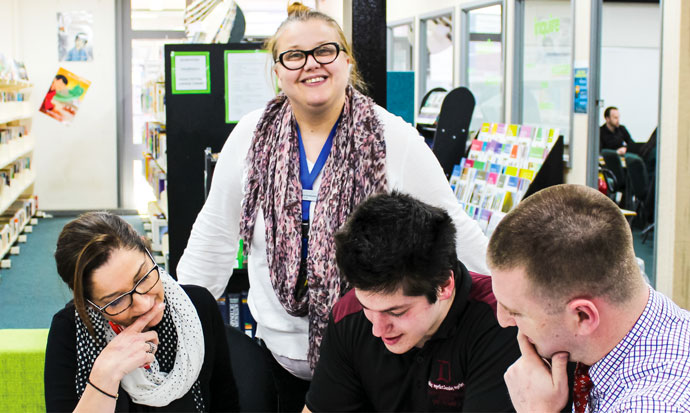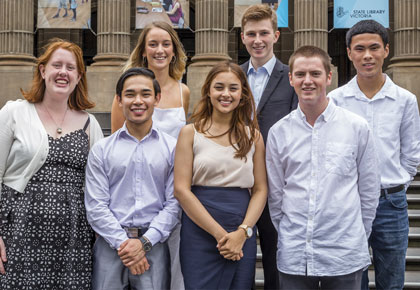February lead stories
Boosting learning: Specialist Teachers and the F–10 curriculum

Specialist STEM teacher, Vicky Sapardanis, and colleagues.
Over 3000 Victorian teachers have already taken advantage of the VCAA's professional learning to support their knowledge about the Victorian Curriculum F–10, and are taking new skills and knowledge back to their classrooms.
The professional learning is facilitated by a team of VCAA Specialist Teachers through a $21.6 m Education State initiative announced by the Minister for Education that supports teacher capacity to use the Victorian Curriculum F–10 to develop teaching and learning programs for their students. This Curriculum is being used in all Victorian government and Catholic schools.
Specialist Teachers support these areas: Critical and Creative Thinking Capability, Ethical Capability, Digital Coding, Financial Literacy, Health Education and Personal and Social Capability, including respectful relationships, Literacy in the Early Years, Music, and Science, Technology, Engineering and Mathematics (STEM).
Matt Limb, Vicky Sapardanis and Megan Van der Velden are VCAA Specialist Teachers who facilitate professional learning in addition to their classroom teaching roles. They have provided some of their perspectives and insights on the program.
STEM – Vicky Sapardanis
Vicky has taught secondary science and maths for 17 years. Vicky says many teachers feel they have to integrate everything when teaching STEM, which can be overwhelming.
The professional learning sessions explore how to integrate STEM questions and principles into other learning areas.
'I get questions from teachers wondering if they need to teach the unit on its own; but the point is to look at the students, the context of the school and the available resources and map what you want to do with the curriculum tools.'
Digital Technologies (Digital Coding) – Megan Van der Velden
Megan teaches at a primary school in outer metropolitan Melbourne and has strong knowledge of the Digital Technologies curriculum.
Megan says Digital Technologies is about students creating solutions using technology tools, rather than simply being consumers of technology.
'You want to take a step along from them just using technology or playing a game to the student thinking "I can make a game",' she says.
Megan says the Digital Technologies curriculum is not about how the IT works, it's about how to think about it. The Digital Technologies curriculum is 'very much a thinking curriculum'.
'[When students are looking at a project], they've got these requirements … what can you do to meet the requirements? ... build the solution ... analyse how it worked, whether it solved the problem, what could be improved.'
Critical and Creative Thinking – Matt Limb
Matt teaches Science at a primary school in the Geelong area.
Critical and Creative Thinking establishes a set of skills and perspectives for students on thinking processes and how to intentionally apply these (including different types of thinking such as logical, strategic, flexible and adventurous thinking), and encourages confidence in evaluating their own thinking in familiar and unfamiliar contexts.
'I want to engage their curiosity, their inquisitive side, allow them to hold a question without having answers.
'Critical and Creative Thinking increases the scope of what you can do with questions. Students shift from the traditional view of questioning; misconceptions can be corrected.
'Students learn that they can be successful in their learning even when they haven't yet arrived at an answer; they know it's alright to take risks and be willing to take risks.'
Teachers coming to this capability discover that they're already teaching some of it in the classroom, and then gain skills in overlaying the Critical and Creative Thinking capability onto their lessons.
'It's a shift of emphasis,' says Matt. 'Often their experience is that they've been doing it very well, but it's important to describe it. Critical and Creative Thinking boosts learning'.
Specialist Teacher professional learning sessions are available
Government, Catholic and independent school teachers should visit the
Victorian Curriculum F–10 Professional learning webpages and register now to attend online and face-to-face professional learning sessions, which are available in metropolitan and regional areas. More sessions will be scheduled for Terms 2, 3 and 4 during 2018.
There is no cost to attend these sessions.
Teachers and school leaders are encouraged to network with other schools to
book a cluster session in their area.
Back to Top
Victoria's senior secondary leaders commended at ceremony

L to R: Tabitha Anderson, Shadab Safa, Anna Van Vliet, Neha Salahuddin, David Trevorrow, Joe Collins, Henry Wu.
The State Library of Victoria played host to the Victorian Senior Secondary Leadership Awards ceremony on Monday 27 November 2017, where nine outstanding senior secondary students were recognised for their contributions to their schools and communities.
Ms Judith Graley, Parliamentary Secretary for Education, presented the Lynne Kosky Memorial VCAL Scholarships and the VCE Leadership Awards alongside VCAA CEO Dr David Howes and Hana Williamson, daughter of the late Lynne Kosky.
Joe Collins (Tyrrell College) was awarded VCE Leader of the Year. Joe is from Sea Lake, Victoria, a small town in the heart of Australia's wheat belt on the southern shores of Lake Tyrrell in the Mallee. Community vibrancy and sustainability are at the heart of Joe's focus, and have given direction to the many practical community projects he has pursued through his role as Vice President of the Woomelang and District Development Association. As a Rural Youth Ambassador for the Country Education Partnership (CEP) Program, he focused on improving educational opportunities for his peers, in particular, raising public and political awareness of the unique challenges that impact the learning of young people in rural Victoria. Joe hopes that his leadership will encourage future young leaders in his community. 'I hope it inspires the younger generation to step up and contribute to our town's future', he said.
Six other 2017 VCE Leadership Award recipients were recognised at the ceremony: Anna Van Vliet, Woodleigh School; David Trevorrow, Braybrook College; Henry Wu, Camberwell Grammar School; Neha Salahuddin, Mount Waverley Secondary College; Shadab Safa, Cranbourne Secondary College and Tabitha Anderson, Epping Secondary College.
VCE Leadership Awards recognise the efforts of VCE students in promoting leadership and participation in their school and local community. The awards are open to government, Catholic and independent school students. Mature age students are also encouraged to apply for these awards.
The Lynne Kosky Memorial VCAL Scholarship recipients Patrick Cole (Chisholm Institute of TAFE) and Jack Lee (Bayside P–12 College) were recognised for their significant contributions to their schools, organisations and communities. The scholarship, first presented in 2015, provides students with financial assistance of $5000 per year for up to five years while engaged in education and training. The scholarships honour former Victorian Education Minister Lynne Kosky and her advocacy for quality education and are designed to give recipients the best opportunity to succeed in their studies, regardless of economic, family or social circumstances.
Speaking at the awards ceremony, Ms Graley commended all the award recipients for their commitment to making a change. She complimented the students for standing out in a field of very high quality applications. 'We again had an incredible array of student leaders who have worked to champion causes that matter to them, and to other young people', she said.
Find out more about the
2017 VCE Leadership Awards and the
Lynne Kosky Memorial VCAL Scholarships.
Back to Top
VCAA CEO is on Twitter
The VCAA's Chief Executive Officer has launched a Twitter account for the beginning of the 2018 school year. This will supplement VCAA's existing communications and highlight news and events.
Principals, teachers, students, school and TAFE administrators, subject associations and sector authorities who use Twitter are invited to follow the account
@VCAACEOand retweet any content of interest. Public sector employees are reminded of
Victorian Government guidelines regarding use of social media.
Back to Top